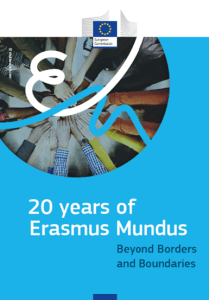Stay in the loop! Subscribe to our mailing list
The Erasmus Mundus community, bringing together programme coordinators, institutional leaders, students and alumni, as well as EU policymakers and higher education stakeholders, celebrated the 20th anniversary of this flagship EU programme at an international conference on 27-28 May in Brussels, Belgium.
Hosted by the European Commission’s Directorate General for Education and Culture (DG EAC) and the European Education and Culture Executive Agency (EACEA), the conference was opened by Commissioner Iliana Ivanova (via a recorded message) and the Director-General Pia Ahrenkilde Hansen.
 The conference participants jointly explored the long-standing impact of Erasmus Mundus and the pathways for the future, informed by a dedicated study “20 years of Erasmus Mundus: Beyond Border and Boundaries” commissioned by EACEA and DG EAC. Developed by ACA as part of the Erasmus Mundus Support Initiative (EMSI), in collaboration with experts Daniela Craciun, Madalena Pereira, Mirko Varano and Andries Verspeeten, the study investigated positive changes triggered by the programme at individual, institutional, national, European and global levels in a long run. The study also put forward some first ideas on how to ensure the programme’s success in the years to come.
The conference participants jointly explored the long-standing impact of Erasmus Mundus and the pathways for the future, informed by a dedicated study “20 years of Erasmus Mundus: Beyond Border and Boundaries” commissioned by EACEA and DG EAC. Developed by ACA as part of the Erasmus Mundus Support Initiative (EMSI), in collaboration with experts Daniela Craciun, Madalena Pereira, Mirko Varano and Andries Verspeeten, the study investigated positive changes triggered by the programme at individual, institutional, national, European and global levels in a long run. The study also put forward some first ideas on how to ensure the programme’s success in the years to come.
The discussions at the conference showed that two decades since its launch, in 2004, the programme still stands out in the panoply of EU-level instruments facilitating international cooperation in higher education. That is thanks to its unique support for the joint design and delivery of high-quality study programmes at Master’s level, increasingly in cooperation with non-European partners, and its appealing scholarship scheme, attracting top talented students from around the world to study at minimum three higher education institutions in Europe, through jointly developed interdisciplinary curricula. The recording of Day 1 conference discussions can be watched here.
The discussions on the future of Erasmus Mundus started at the conference. They will continue as part of the mid-term evaluation of the current Erasmus+ programme and inform the design of the next programme in line with the policy objectives set under the European Education Area (EEA) and the European Strategy for Universities. The proceedings of the conference, capturing also the many ideas on the future of the programme, will be published in the coming weeks.
ACA has been highly supportive of Erasmus Mundus since its launch, also being instrumental in setting up the Erasmus Mundus Students and Alumni Association (EMA), and continues to empower the programme through the current EMSI initiative, together with NTT DATA, DAAD and Tipik.
